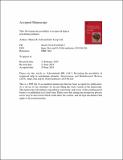Files in this item
Revisiting the possibility of reciprocal help in non-human primates
Item metadata
| dc.contributor.author | Schweinfurth, Manon K. | |
| dc.contributor.author | Call, Josep | |
| dc.date.accessioned | 2020-06-19T23:34:51Z | |
| dc.date.available | 2020-06-19T23:34:51Z | |
| dc.date.issued | 2019-09 | |
| dc.identifier | 259478478 | |
| dc.identifier | 7852e915-55ad-4734-a79f-58061e7cd7b0 | |
| dc.identifier | 85068404680 | |
| dc.identifier | 000483640500009 | |
| dc.identifier.citation | Schweinfurth , M K & Call , J 2019 , ' Revisiting the possibility of reciprocal help in non-human primates ' , Neuroscience and Biobehavioral Reviews , vol. 104 , pp. 73-86 . https://doi.org/10.1016/j.neubiorev.2019.06.026 | en |
| dc.identifier.issn | 0149-7634 | |
| dc.identifier.uri | https://hdl.handle.net/10023/20113 | |
| dc.description | The Swiss National Science Foundation provided funding to MKS (grant number P2BEP3 175269). The European Research Council provided funding to JC (Synergy grant 609819 SOMICS). | en |
| dc.description.abstract | Reciprocity is a ubiquitous and important human trait. Still, the evolutionary origin is largely unclear, partly because it is believed that our closest living relatives, other primates, do not reciprocate help. Consequently, reciprocity is suggested to have evolved in the human linage only. However, our systematic review of studies investigating reciprocity in non-human primates revealed that, contrary to common perception, there are more positive than negative findings in both experimental and observational studies. Furthermore, we argue that negative findings can provide important insights. We found that reciprocity is not confined to unrelated individuals. In addition, reciprocity can be influenced by the choice of experimental design, relationship quality, social services and temporal scales. Thus, negative findings should not be used as evidence of no reciprocity but as the building blocks for a more comprehensive theory. Based on our review, we conclude that reciprocity in primates is present but underestimated. We close by suggesting further steps that could pave the way for future research aimed at understanding the evolutionary origins of reciprocity. | |
| dc.format.extent | 14 | |
| dc.format.extent | 691577 | |
| dc.language.iso | eng | |
| dc.relation.ispartof | Neuroscience and Biobehavioral Reviews | en |
| dc.subject | Evolution | en |
| dc.subject | Cooperation | en |
| dc.subject | Reciprocity | en |
| dc.subject | Exchange | en |
| dc.subject | Help | en |
| dc.subject | Market | en |
| dc.subject | Primates | en |
| dc.subject | BF Psychology | en |
| dc.subject.lcc | BF | en |
| dc.title | Revisiting the possibility of reciprocal help in non-human primates | en |
| dc.type | Journal item | en |
| dc.contributor.sponsor | European Research Council | en |
| dc.contributor.institution | University of St Andrews. School of Psychology and Neuroscience | en |
| dc.identifier.doi | https://doi.org/10.1016/j.neubiorev.2019.06.026 | |
| dc.description.status | Peer reviewed | en |
| dc.date.embargoedUntil | 2020-06-20 | |
| dc.identifier.grantnumber | 609819 | en |
This item appears in the following Collection(s)
Items in the St Andrews Research Repository are protected by copyright, with all rights reserved, unless otherwise indicated.

